Are you looking to present your big idea in a compelling way? Crafting a strategic investment proposal can be your ticket to securing the support and funds you need. By outlining your vision, market potential, and projected returns, you can engage potential investors and spark their interest effectively. Dive into our article to discover the essential elements that make a proposal stand out!

Executive Summary
The strategic investment proposal outlines a comprehensive plan for enhancing the growth trajectory of Company XYZ, a leading firm in renewable energy solutions. This proposal highlights an opportunity to secure a $2 million investment in advanced solar technology development. The initiative aims to boost efficiency by 25%, leveraging cutting-edge photovoltaic materials developed by researchers at MIT. The market for solar energy is projected to reach $200 billion by 2025, driven by increasing demand for sustainable energy sources. Collaborations with key industry players and government incentives provide a robust framework for potential returns. An extensive risk assessment indicates manageable factors, with a focus on market trends and technological advancements. This executive summary encapsulates the potential of transforming Company XYZ into a market leader, contributing to environmental sustainability while delivering lucrative returns for investors.
Investment Thesis
Strategic investments play a crucial role in enhancing a company's growth trajectory, facilitating market expansion, and augmenting competitive advantages. A robust investment thesis articulates the underlying rationale for pursuing a specific opportunity, identifying potential returns and aligning with long-term corporate goals. Key factors include market analysis, highlighting sectors projected for growth, such as renewable energy or biotechnology, based on reports predicting a compound annual growth rate (CAGR) of 20% in the latter through 2027. Financial metrics, including projected internal rates of return (IRR) above 15%, are essential for justifying commitments. Additionally, assessing strategic fit remains pivotal, addressing how the investment aligns with existing product lines or geographical reach, such as entry into emerging markets in Southeast Asia, where GDP growth rates exceed 6%. Understanding operational synergies, leveraging innovative technologies, and fostering key partnerships will solidify the investment's potential impact on enhancing shareholder value.
Market Analysis
The strategic investment proposal includes a thorough market analysis, focusing on the global electric vehicle (EV) sector, which is projected to reach a valuation of $800 billion by 2027. Key players in this market include Tesla, Nissan, and BMW, which have established significant market share in North America and Europe. Consumer demand for sustainable transportation solutions has surged by 25% in the past year, driven by environmental concerns and government initiatives promoting green energy. Additionally, advancements in battery technology, particularly Lithium-Ion, have enhanced vehicle range and performance, making EVs more appealing to a broader audience. The analysis highlights the growing infrastructure for charging stations, with over 100,000 locations available in the United States alone as of 2023, facilitating the shift towards electric mobility. Potential challenges include fluctuating raw material prices, regulatory hurdles in various regions, and the competitive landscape that requires continuous innovation.
Financial Projections
The financial projections for the strategic investment proposal highlight the expected revenue growth, operational costs, and profitability margins over the next five years. Significant metrics include a projected revenue increase of 30% annually, reaching $5 million by year five. The initial investment requirement is estimated at $1 million, allocated to product development and marketing efforts. Operational expenses are anticipated to stabilize around 20% of revenue, ensuring a healthy profit margin of approximately 25%. Break-even analysis indicates that the investment will pay off within the first two years, with cash flow turning positive by year three, supported by strong market demand in the tech sector, particularly in the burgeoning artificial intelligence industry. Key milestones such as product launch and customer acquisition strategies will drive these financial projections, making it a compelling opportunity for potential investors.
Risk Assessment
Undertaking a strategic investment proposal entails a comprehensive risk assessment to identify potential threats associated with the investment venture. Market volatility, influenced by economic downturns or fluctuating interest rates (e.g., exceeding 5% in inflation), can heavily impact projected returns. Competitive landscape analysis may reveal emerging players within the industry, such as innovative startups, that could undermine market share. Regulatory challenges, especially within specific sectors like healthcare or technology, must be meticulously evaluated as changes in legislation can introduce unforeseen costs. Operational risks related to supply chain disruptions may arise from global events, such as pandemics or geopolitical tensions (examples include trade wars or sanctions), that affect sourcing and distribution channels. Financial risks, including poor credit ratings leading to higher borrowing costs, need careful analysis to ensure sustainable liquidity. Each identified risk should be rated for impact and likelihood, creating a risk matrix that guides decision-making, ultimately enhancing the robustness of the investment strategy.
Letter Template For Strategic Investment Proposal Samples
Letter template of investment collaboration proposal for sustainable projects


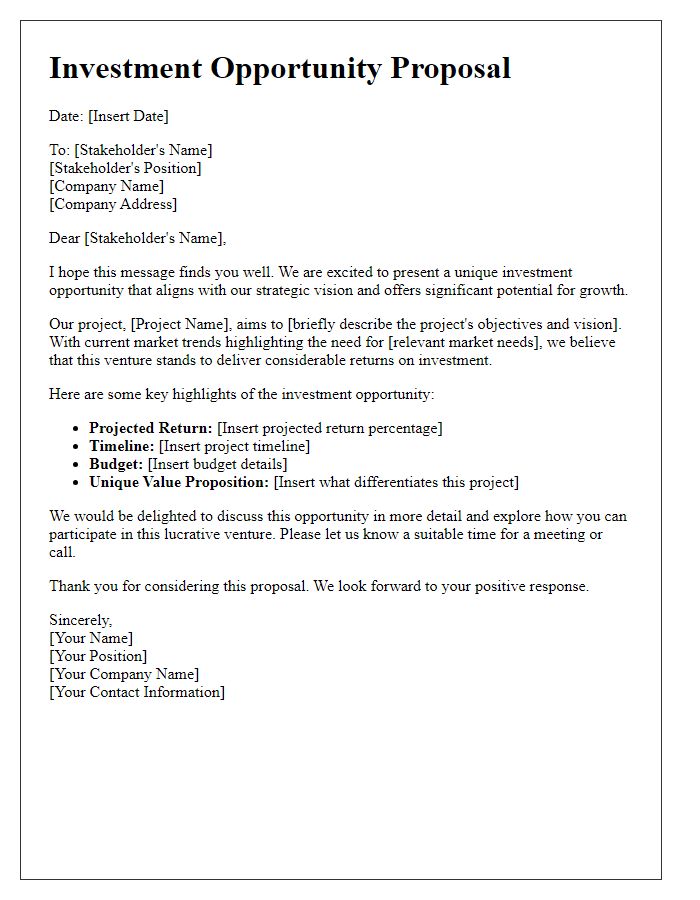
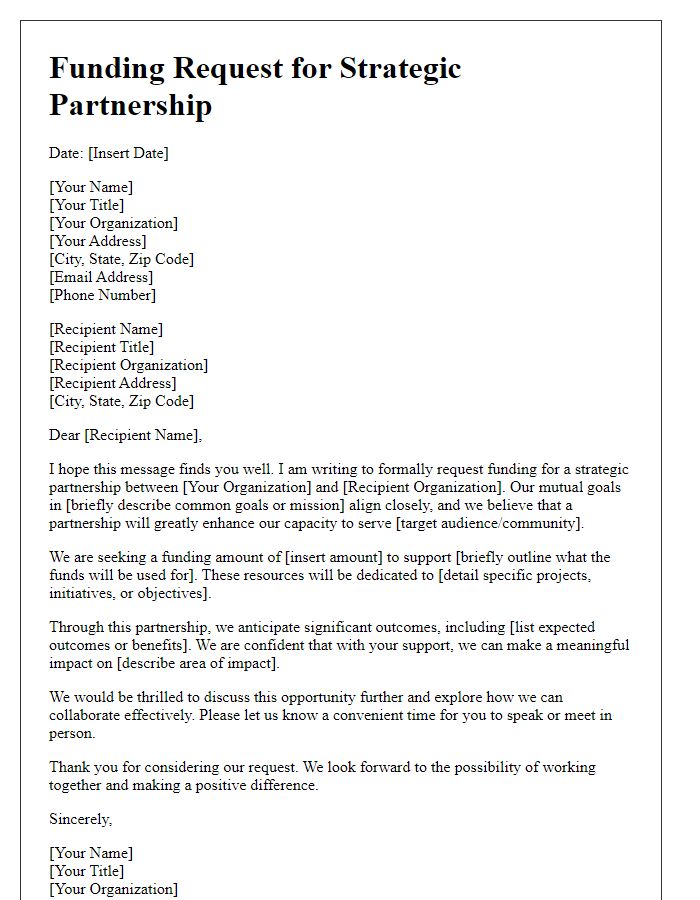
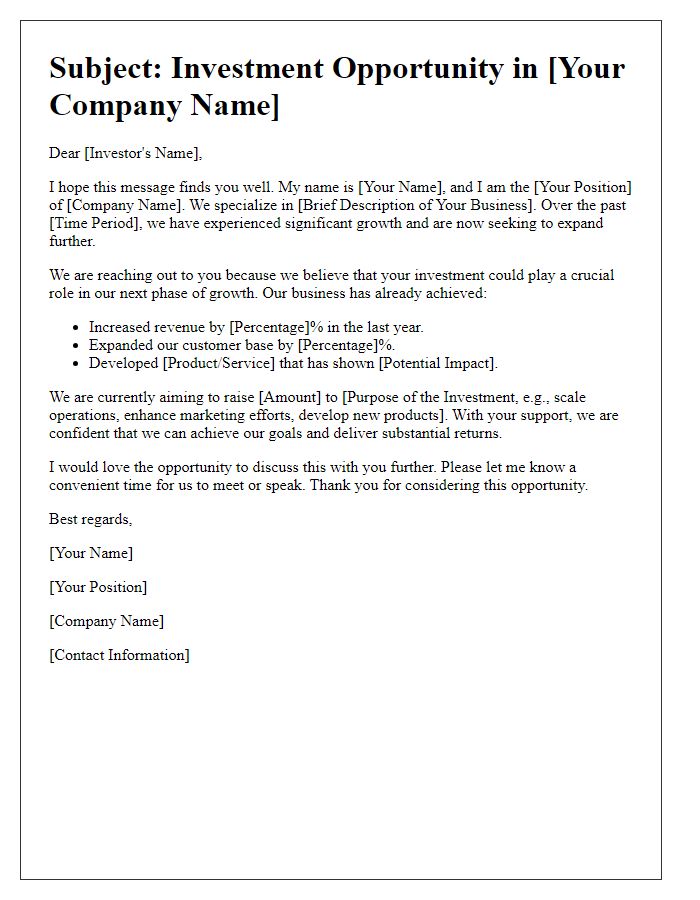
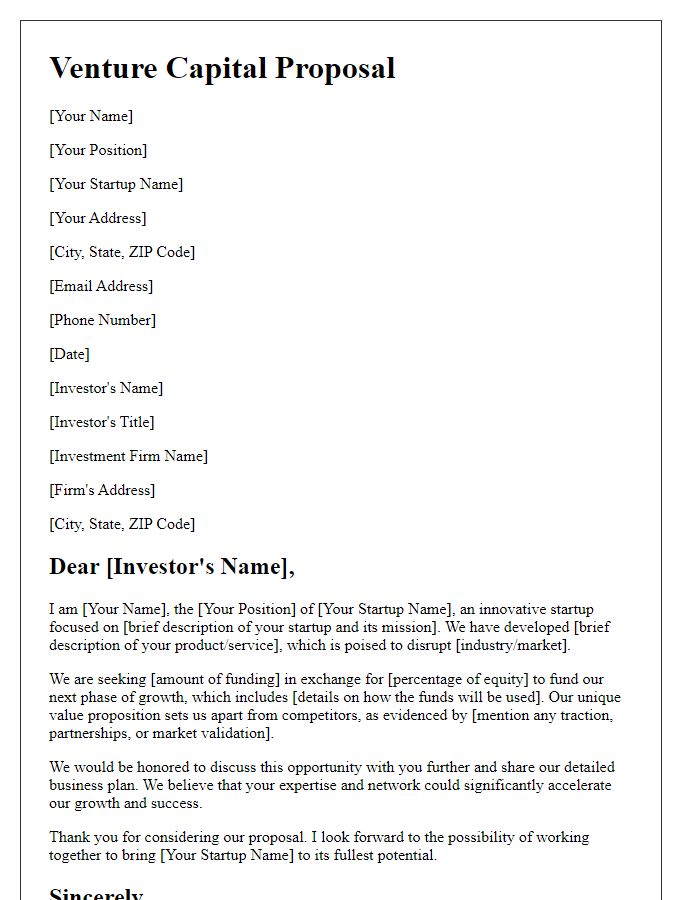
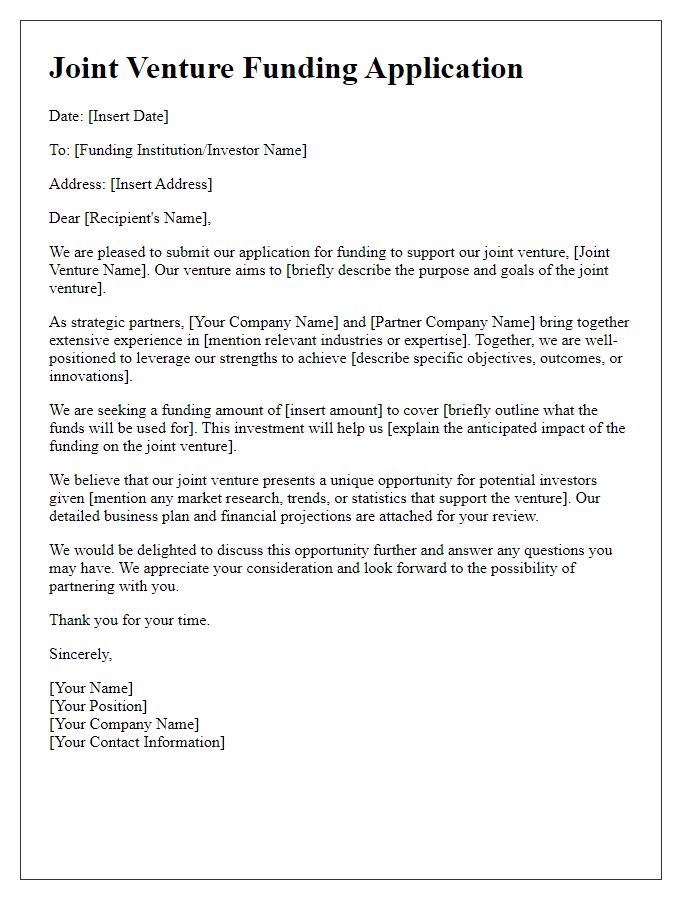
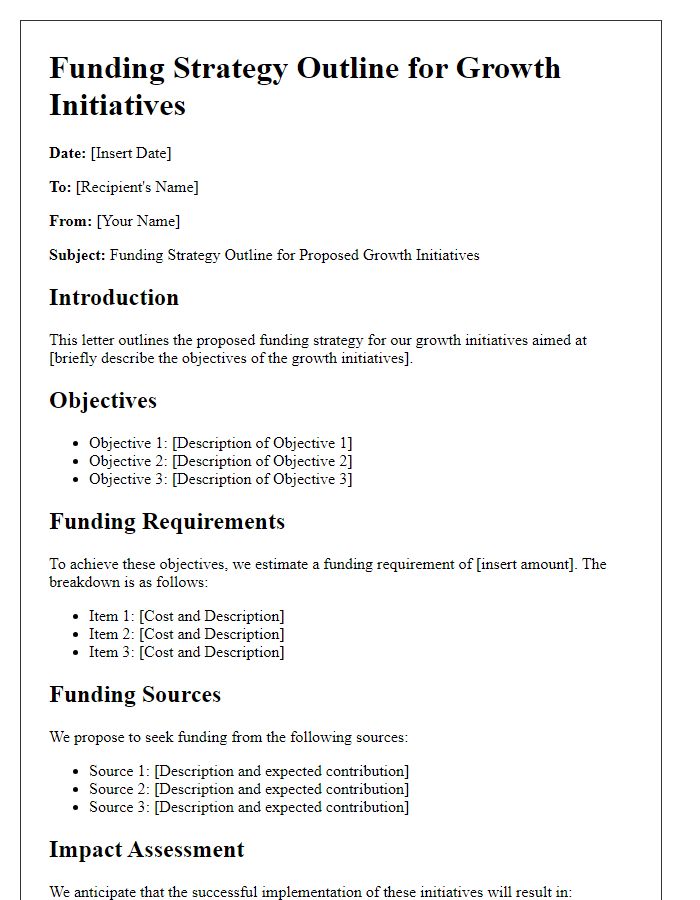
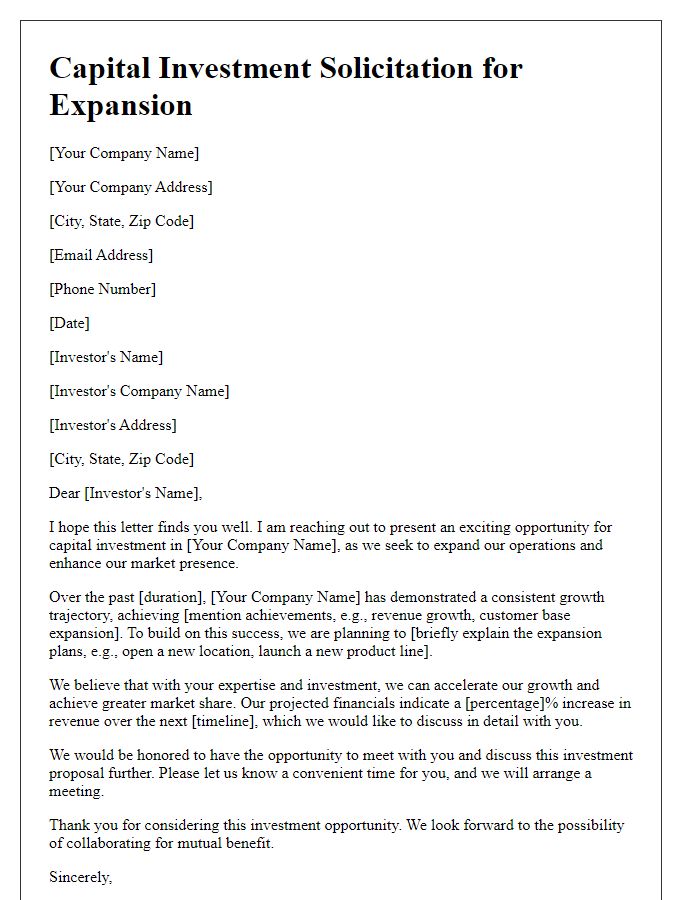
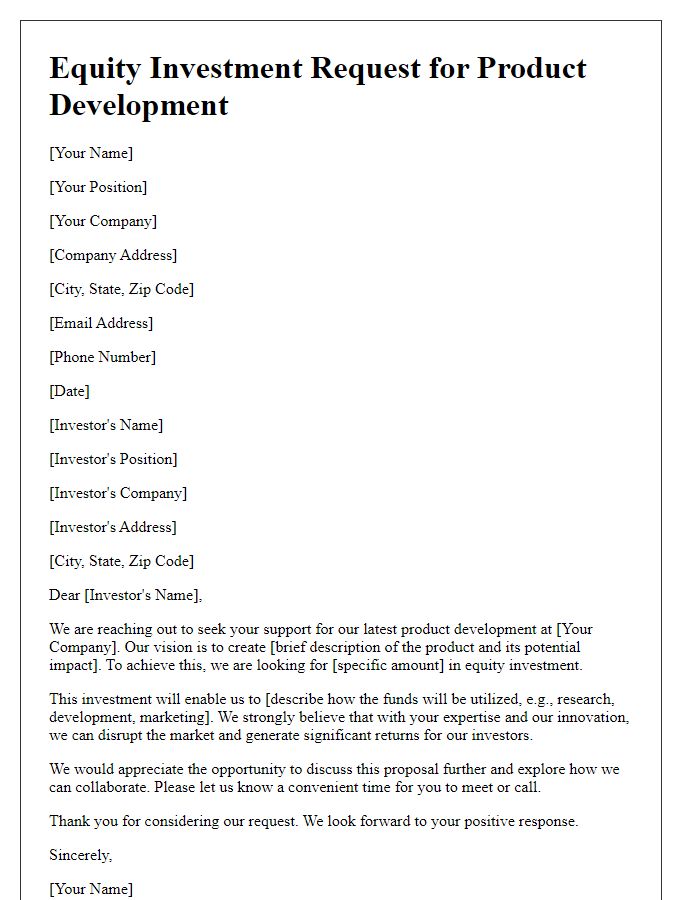
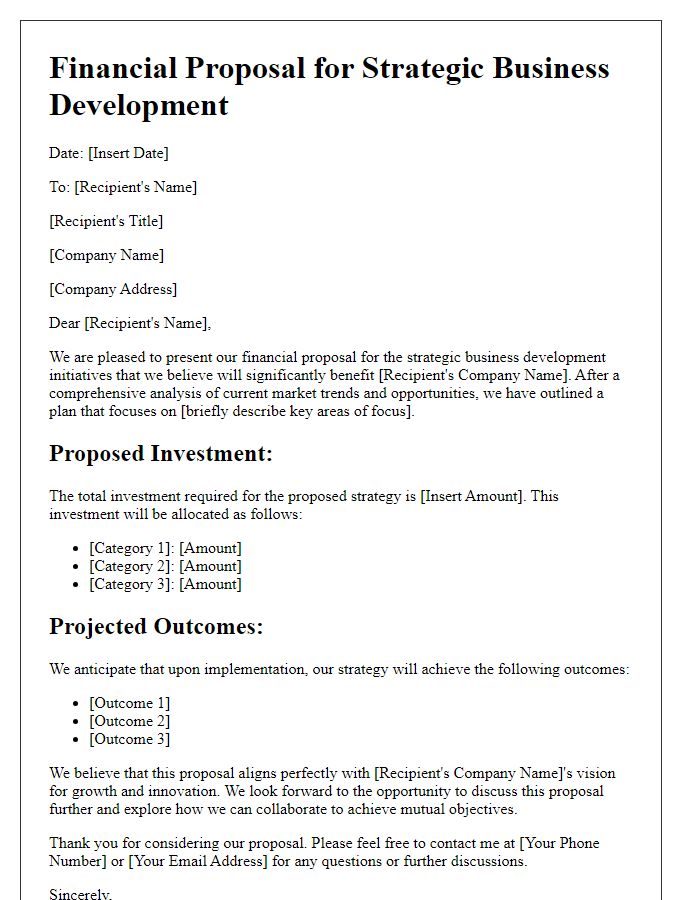


Comments